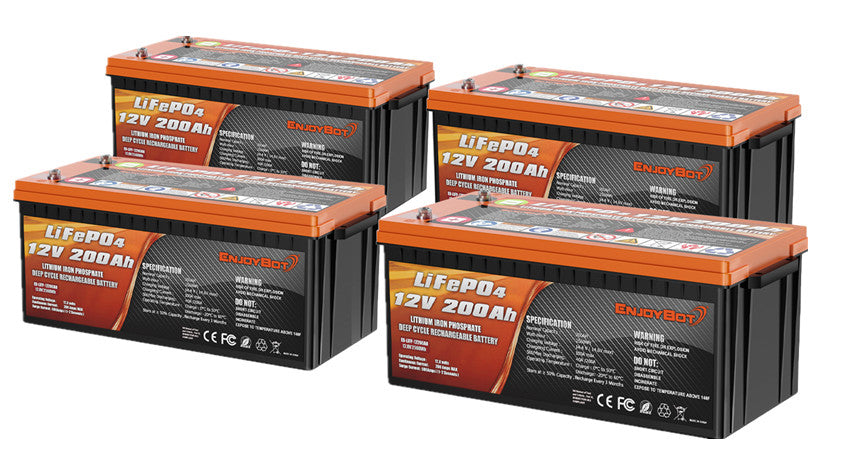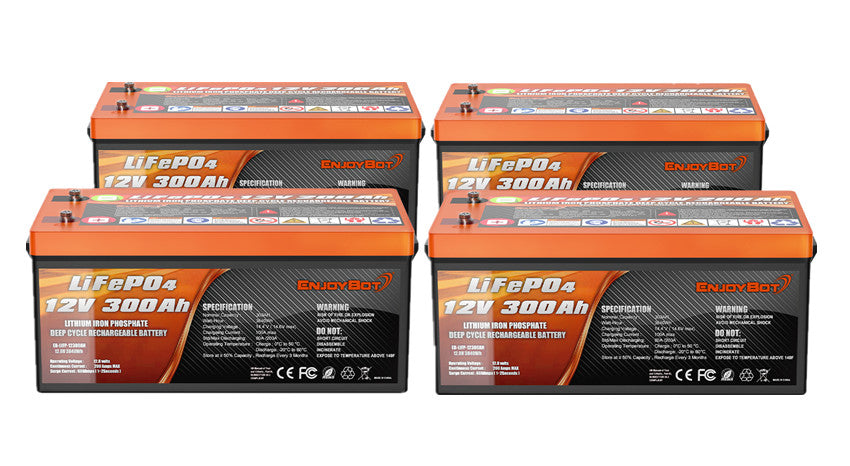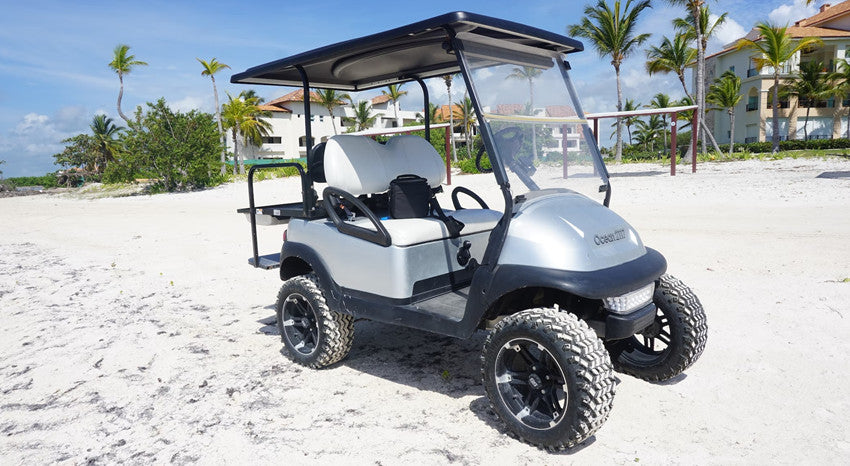How to Get the Most out of Electrical Golf Carts
How to Get the Most out of Electrical Golf Carts
Many inventions have made our lives a bit easier, and electric golf carts are no exception. It is not just for the golf course, you can also use the golf cart for yard work, at a park, at events, when camping, or In these applications where a small, zippy vehicle can help.
Before purchasing, you have to understand a few things about the range, batteries, and maintenance so you can choose the most favorable option. To get the best performance with electric golf carts, you also have to know which battery works best and how to take care of it. Let’s take a look.
What Is an Electric Golf Cart?
An electric golf cart is an electric vehicle that traditionally transports golfers and caddies around the course. However, many people use them for transportation in places where cars won’t fit. For example, RVers might use golf carts to get around a campground, or the staff might use golf carts to travel safely through crowds of people during a big event.
Golf carts are traditionally gasoline-powered, but a new version of the handy vehicle is emerging that is all-electric. It relies on deep-cycle batteries that recharge between uses. Additionally, the electric golf cart is quieter, more eco-friendly, and more convenient for golf cart drivers.
What Is the Range of the Electrical Golf Cart?
The range can vary with electric golf carts; however, 30 to 45 miles is standard. It is ideal for short trips, and most people do. Even if you are using the cart for a full day of driving around an event venue, you probably won’t use up the entire 30 to 45 miles range, and you can always just plug it in if you need.
Where you are driving, how much you stop and go, and what accessories you are using can affect the cart’s mileage per charge. Taking good care of your electric vehicle and using lithium-iron phosphate (LiFePO4) batteries rather than lead-acid batteries can extend the cart’s range as well.
About Electric Golf Cart Batteries
Electric golf carts need different batteries, depending on the cart type you have. Batteries will depend on the voltage required. You will need to know your golf cart’s battery type and how many you will need before buying.
What Kind of Batteries Do Electric Golf Carts Typically Use?
Golf carts might use a type of lead-acid or lithium-iron phosphate (LiFePO4) battery. Specifically, deep-cycle flooded lead-acid (FLA) batteries are the most common battery type found in golf carts. You might hear that people call flooded lead-acid wet batteries.
The FLA battery has been the industry standard because of its cost-effectiveness, reliability, and safety. They typically last for around 3 to 5 years but if you discharge them below 50%, which will shorten their lifespan. They are a good option, but they need regular maintenance such as topping off the water inside the reservoir.
An up-and-coming option for electric golf cart power is lithium-iron phosphate (LiFePO4) batteries. This technology is superior to its lead-acid counterparts. They are more expensive, but because the batteries can last for 8 to 10 years with a full warranty, most users find them to be cheaper than wet batteries. You can also completely discharge them without damage.

How many batteries do electric golf carts need?
The short answer is most carts require three, four, six, or eight batteries. But it depends on the voltage of your electrical drive system and what kind of batteries you use (usually 36V or 48V).
Golf carts usually need batteries that are 6V, 8V, or 12V, and the number you need that is depending on the cart. It could require anywhere from three to eight batteries, depending on the drive system size and the type of batteries you choose.
Before buying a golf cart, knowing how many batteries the cart will require will help you determine your overhead and maintenance costs as well as the power.
You can figure out how many batteries your golf cart needs by looking at the battery compartment. You will see several holes or cells, usually between three and six. Each cell equals 2V (this depends on the type of battery), so double the number of holes, and you will have your cart’s voltage.
Since most golf carts have a 36-volt or 48-volt electrical drive system, you can count the number of holes to determine the voltage of batteries you require. Then put these batteries adding together to equal the voltages in the system.
So, three holes in your battery compartment would mean your cart takes 6-volt batteries. If you have a 36V system, you will require a total of six 6-volt batteries. If your rig uses 6-volt batteries and it is a 48-volt system, you will need four 12-volt batteries.
Common Issues with Electric Golf Cart Lead-Acid Batteries
Although lead-acid batteries have been the industry standard for decades, however, there are a few key issues existing. For example, voltage drop, water level maintenance, range, and overcharging are some of the most harrowing.
Perhaps the most frustrating is dealing with a dead battery. Lead-acid batteries drain faster than lithium-ion batteries, and they incur damage every time the charge drops below 50%. Each time this happens, the battery takes on more damage until it no longer holds a charge. These batteries can last five years, but they rarely make it that long because it is easy to discharge them below 50%.
Get More Out of Your Electric Golf Cart By Upgrading to a Lithium
Many electric golf carts come with lead-acid batteries, but that does not mean you have to keep them. You can convert your golf cart to a more reliable option of lithium iron phosphate (LiFePO4) batteries and enjoy virtually maintenance-free battery life.
Can You Switch Your Electric Golf Cart to Lithium batteries?
Yes, you can switch your electric golf cart to lithium batteries. Enjoybot batteries are drop-in replacements for typical lead-acid batteries so the conversion will need minimal effort on your part. You might still need additional components and programming for your golf cart, but usually, it is an affordable shift.

Advantages of Lithium Batteries for Electric Golf Carts
We have already mentioned some of the benefits of using lithium iron phosphate (LiFePO4) batteries on an electric golf cart, but we wanted to go into greater detail for you. Here are some things you can expect as you make the switch.
Longer Range
Lithium iron phosphate (LiFePO4) batteries have a more extended range per charge. Essentially, you can go further on a single charge from your lithium iron phosphate (LiFePO4) battery bank than you could with your lead-acid battery bank.
Not only that, but the lithium batteries charge faster (so you can be on your way faster) and give you 100% power 100% of the time.
Charge Faster
For many golf cart users, the charging time is the most frustrating part of an electric golf cart. When the battery dies, you have to wait a few hours for recharging before you can use it again, especially if you have lead-acid batteries that can take 8-10 hours to reach full charge.
On the other hand, you can fully charge a lithium-iron phosphate (LiFePO4) battery in 2 to 3 hours(Charging time depends on battery charger specification). If you use your golf cart frequently, this benefit brings you a convenient experience.
Power Availability (Less Voltage Drop)
When lead-acid batteries are brand new, they are at their peak performance. As you use and discharge them, they experience a phenomenon called voltage drop, in which the amount of power that runs to your cart’s engine is lower. This is because the battery heats up and loses charge while you are driving, leading to a slower cart with less torque.
Lithium-iron phosphate (LiFePO4) batteries do not have this problem. Their power level remains the same, whether you are at 100% capacity or 20%. Like your laptop, it will continue working at full capacity until it dies.
Longer Lifespan
Lead-acid batteries can not compare to the lifespan of lithium batteries. Most lead-acid batteries have a lifespan of 500-800 cycles with a warranty of 2-3 years (if you are lucky). On the other hand, Enjoybot lithium batteries can last 3,000-5,000 cycles or more, plus a 10-year warranty. That is up to 10 times as long as lead-acid batteries will last you.
Most importantly, lithium-iron phosphate golf cart batteries do not lose power when discharged below 50%. You can discharge them to 20% of their charge capacity without worrying about damaging them. Most lithium batteries have a built-in shut-off so it won’t drop below 20%, so you won’t even risk damaging it by discharging it all the way.
No Maintenance
The FLA battery commonly used in golf carts requires regular maintenance. When you drive, the battery will heat up, it evaporates the water inside, and you need to fill the water regularly. It is easy to do the maintenance, but if you forget about it and it dries up, it will be the end of your battery.
You don’t have to worry about maintenance as often with using lithium batteries, and you won’t have to add water inside or clean as much. You can use them without hassle.

Other Tips to Get the Most out of Your Electrical Golf Cart
While the power source is among the electric vehicle’s most important features, but it is not the only one. Taking good care of every part of your electric vehicle will help ensure a long and productive life for your golf cart. Here are a few other areas that require maintenance during the life of the cart.
Tire Maintenance
Your golf cart's tires contribute to everything from a smooth ride to more efficient mileage for your batteries. A tire with less-than-optimal air pressure will slow your cart down and create unnecessary wear and tear on your tires.
Most golf cart tires have a recommended pressure between 15 and 25PSI, but check your user's manual for the exact specifications. Buying a pressure monitor (manual or digital) and checking the pressure often.
Joint Lubrication
Although a golf cart looks like a small motor vehicle, it has several complicated parts. Lubricating the joints will ensure your electric golf cart runs better. The areas that need the most attention are the steering wheel and the suspension pieces under the golf cart.
You can check your user's manual for specifications instructions and the type of oil you should use for lubrication.
Inspect Brakes
Ignoring a brake problem could be deadly, so check your brakes regularly. If you take your golf cart for regular maintenance, have the mechanic check your brakes each time.
The brakes might be worn out if you feel vibrations in your steering wheel when you hit the brakes, the brakes squeak, lock or stick, or you have to push harder to get the brakes to engage. If you suspect something is wrong, take them to a professional for checking it out right away.

Conclusion
Electric golf carts are handy as long as you take good care of them. Things like addressing maintenance requirements quickly and upgrading your golf cart batteries can lead to a more reliable vehicle wherever you choose to use it. This means that you can spend more time playing and less time worrying. Get out there and stay out there!

















![[Upgraded Version] Enjoybot 14.6V 20A Waterproof Mountable LiFePO4 Lithium Battery Charger For 12V LiFePO4 Battery](http://enjoybot.com/cdn/shop/files/14.6V_20A_Waterproof_Battery_Charger_1_360x.jpg?v=1752565609)
![[Upgraded Version] Enjoybot 14.6V 20A Waterproof Mountable LiFePO4 Lithium Battery Charger For 12V LiFePO4 Battery](http://enjoybot.com/cdn/shop/files/14.6V_20A_Waterproof_Battery_Charger_2_360x.jpg?v=1752637374)















